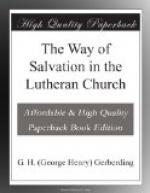It is not at all the pastor’s place, and it should never be expected of him, to act the school-master, to see to and oversee the memorizing of the answers. It is his office to expound and apply the truth, to make the doctrines clear to the minds of the learners, and to show how they are all related to the individual life.
But, alas, how little is this understood or practiced! How many parents, who call themselves Christians, and Lutherans, seem to think that they have nothing to do in this whole matter! They seem to think that if they send their children once a week, for a few months, to the pastor’s class, they have done their whole duty. They do not so much as help and encourage the children to learn the lessons that the pastor assigns. And thus does this part of the pastor’s work, which ought to be among the most delightful of all his duties, become wearisome to the flesh and vexatious to the spirit. Scarcely anywhere else in all his duties does a pastor feel so helpless and hopeless and discouraged, as when standing week after week before a class of young people who have such poor instructors at home.
Christian parents, if you desire your sons and your daughters to become steadfast and useful members of the Church of Christ, see to it that you do your part in their religious instruction. Insist on it, and even use your parental authority, if necessary, that your children learn the Catechism and regularly attend the pastor’s instructions.
We believe that the trouble in this matter lies largely in the fact that catechisation has become unpopular in our fast age. It is looked upon as a mark of old-fogyism, if not as an evidence of the absence of “spiritual religion!” The new measures and methods of modern revivals are more acceptable to the fickle multitude. They seem to point out a shorter route and quicker time to heaven. As a boy once said to the writer: “I don’t want to belong to your church, because I would have to study the Catechism all winter, and down at the other church I can ‘get through’ in one night.” That boy expressed about as clearly and tersely as could well be done, the popular sentiment of the day.
Yielding to this popular sentiment, many churches, that once adhered strictly and firmly to the catechetical method, having either dropped it entirely or are gradually giving it up. And in order to clothe their spiritual cowardliness and laziness in a pious garb, they say: “The Bible is enough for us.” “We don’t need any man-made Catechisms.” “It is all wrong anyhow to place a human book on a level with or above the Bible.” “We and our children want our religion from the Spirit of God, and not from a Church Catechism,” etc., etc.
Do such people know what they are talking about, or do they sometimes use these pious phrases to quiet a guilty conscience? Do they know what a Catechism is?
Look at it for a moment. What is the nature and object of Luther’s Small Catechism? Is it in the nature of a substitute for the Bible? Does it purpose to set aside the Bible? We can scarcely muster patience enough to write such questions. No! No!




